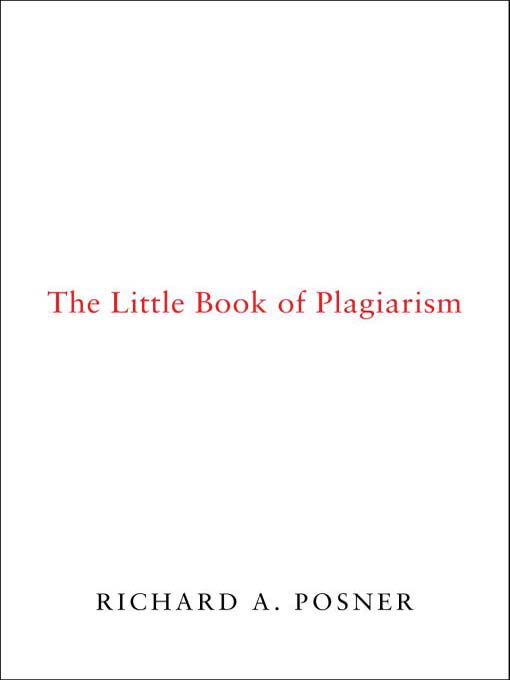- Featured Magazines
- Let's Get Cooking!
- News, Politics, and Business
- Lifestyle Magazines
- Popular Magazines
- All Magazines
- See all magazines collections
Provocative, insightful, and extraordinary for its clarity and forthrightness, The Little Book of Plagiarism is an analytical tour de force in small, the work of “one of the top twenty legal thinkers in America” (Legal Affairs), a distinguished jurist renowned for his adventuresome intellect and daring iconoclasm.
-
Creators
-
Publisher
-
Release date
March 11, 2009 -
Formats
-
Kindle Book
-
OverDrive Read
- ISBN: 9780307496539
-
EPUB ebook
- ISBN: 9780307496539
- File size: 1743 KB
-
-
Languages
- English
-
Reviews
-
Publisher's Weekly
November 27, 2006
Not all plagiarized authors will agree with Posner's conclusion that plagiarism is an "embarrassingly second-rate" offense, "its practitioners... pathetic," and that plagiarism should remain an ethical rather than a legal offense, punished by public shaming. But in a fascinating historical tour of the subject, he dismisses the idea that good art must be totally original. Shakespeare stole the plot of Romeo and Juliet
, and Manet's Olympia
is a reworking of Titian's Venus d'Urbino—
both examples of what Posner calls "creative imitation." But focusing on Kaavya Viswanathan novel, How Opal Mehta Got Kissed, Got Wild, and Got a Life
, Posner (Uncertain Shield
), a judge on the U.S. Seventh Circuit Court of Appeals and expert on intellectual property, says this was a particularly modern, market-driven form of plagiarism: Viswanathan was attempting to compete against Megan McCafferty in the chick lit market by appropriating her competitor's own words. Posner focuses a lot on student plagiarism and seems to think all students should be considered suspect; schools that don't subscribe to detection software like Turnitin, he says, are "naïve." Indeed, he believes publishers should, and will, begin to use such programs, concluding, optimistically, "We may be entering the twilight of plagiarism." It's unfortunate that Posner briefly brings politics into this important and timely discussion, superciliously accusing the so-called academic left of being "soft on plagiarism." -
Booklist
December 15, 2006
Posner here seeks to define " plagiarism," a crime that proves elusive on close inspection. The high-profile federal judge asserts that plagiarism conceals the true author and that the deception induces "reliance" on the part of readers; in other words, readers buy books they would not have if they had known the books contained unauthorized copying. Posner cites as an example Kaavya Viswanathan's chick-lit debut, " How Opal Mehta Got Kissed "(2006), which appeared to lift passages from novelist Megan McCafferty. But, asks Posner, are readers of ghostwritten books, textbooks, team-written formula fiction, judicial opinions, and Shakespeare also consuming plagiarized works? Posner's counterintuitive strategy of investigating readers' expectations, and weighting them at least equally to the writer's intentions, turns up various ambiguities in distinguishing copied writing from created writing. Yet society viscerally recognizes the literary rip-off and imposes severe penalties for it: expulsions for students, firings for journalists, ruined reputations for authors and politicians. Pleading for cool thought about plagiarism, Posner's analysis will enlighten all who work with words.(Reprinted with permission of Booklist, copyright 2006, American Library Association.)
-
Formats
- Kindle Book
- OverDrive Read
- EPUB ebook
subjects
Languages
- English
Loading
Why is availability limited?
×Availability can change throughout the month based on the library's budget. You can still place a hold on the title, and your hold will be automatically filled as soon as the title is available again.
The Kindle Book format for this title is not supported on:
×Read-along ebook
×The OverDrive Read format of this ebook has professional narration that plays while you read in your browser. Learn more here.


